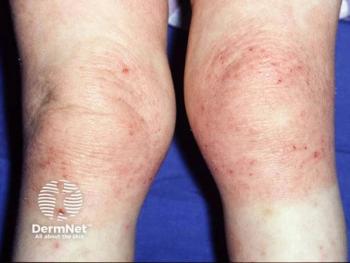
Communication About Adverse Effects of Atopic Dermatitis Treatments
Drs Noor and Lamb highlight the importance of frank discussion of adverse effects of atopic dermatitis treatments with patients.
Episodes in this series

Neal Bhatia, MD: Omar, I’ll bring up one other thing about compliance, and it’s a discussion of adverse effects. When we talk about JAK [Janus kinase] inhibitors and biologics, when we get to that stage, what kind of conversation do you have with patients about what they interpret as adverse effects or what they’ve read? You go to some of the websites and it’s all safety information first and efficacy later. What is your take with that?
Omar Noor, MD, FAAD: Coming back to communication, our ability to communicate not only their condition and their atopic dermatitis, but to communicate the different options available to them; we are lucky now in this 2022 world that we have more advanced therapeutic options for patients. Like you mentioned Angela, long gone are the days of methotrexate, which is nice because there was a time where we had to smash someone’s immune system and suppress it in order to alleviate their symptoms. But with our growing appreciation of the immune system, our growing appreciation of targets on areas that are not functioning correctly, we can assist the immune system to achieve a better homeostasis. That’s where our new options are, and they can then be more targeted for these patients. That first target started with dupilumab.
When talking about adverse effect profiles for medications, for me, they start with blood work or no blood work. It’s an easy place to start. You have 2 different types of medications. One medication when we’re talking about systemic drugs would require us to check your blood work prior to starting it, and from there, we can determine if you’re healthy enough to go on the medication. That discussion right there allows me to then talk more to the adverse effect profile of an oral JAK inhibitor for instance. I can say, “This is why we’re checking your blood work, these are the things we’re going to look for, these are the things that are a possibility.” Then on the other end of that spectrum, we don’t have to check blood work for a medication like dupilumab, which is now approved all the way down to 6 months of age. So we have that discussion, but at the other end of that spectrum, we have to acknowledge that dupilumab is also an injection vs a pill. Everything comes together as far as communication goes. After discussing all the options with my patients, with adverse effects, adverse events, and efficacy, that’s when we decide together what’s going to be the best option for them.
Neal Bhatia, MD: That was a good point about the 6 months, because that’s the next direction I want to go in, with that new indication for dupilumab. It is a bit of a game changer when you think about changing the outcomes for patients who start with horrible eczemas, really young kids, how do we get them into getting into treatment to try to slow things down? We can really make a big impact. Angela I’ll ask you, say you have a parent who comes in with their young one, maybe a year or 2 years old, and you know that dupilumab now has that indication. We also mentioned safety, like Omar brought up about not having to worry about a lot of laboratory tests and things like that. What kind of talking points would you have ready for the parent who’s worried about shots, or worried about what they’ve heard about these biologic agents and some of the stereotypes?
Angela Lamb, MD: The first thing is, I get right out of the gate about what I’ve actually seen. With dupilumab, I definitely have seen the eye-related adverse effects, so I talk about that. I talk about how that definitely happens, but I know how to manage that. I’ve seen it. You’re not going to be blind. I think that’s the biggest one because sometimes people don’t understand the nomenclature that they read. They read about eye redness and they ask, “Is my child going to not be able to see anymore?” And I say no, it’s some irritation, we can manage it with some steroid drops or some moisturizers for the eye. I talk them through that if they were to have adverse effects, I know how to manage them and I feel comfortable.
Also, I talk about the fact that I have given a lot of this medication. People want to know if you’re giving what they perceive as high risk, though I don’t necessarily perceive it as high risk, they want to know that you’ve written a lot of these prescriptions, that you feel comfortable with it, and if something were to come up that you know how to manage it. So again, some of the injection site reactions, I’ve seen that, I know how to manage it. I think that’s really important, getting out in front of the fact that certainly patients are going to read these, and if they do happen, I’ve written a lot of this, I know how to manage them. Instead of minimizing and gaslighting people, and telling them that’s silly, I think you do have to validate, particularly when it comes to someone’s child. But I think these medications are game changing, particularly dupilumab, and I would give it to a 6-month-old in a heartbeat.
Neal Bhatia, MD: I think those are all pivotal to make the parents, not just more at ease, but to think this is more of a marathon than a sprint. I want to go back to one thing you said before too about what’s FDA approved, what’s immunosuppressive, and the old days of methotrexate. Omar brought up a couple of things about MOA [mechanism of action] that I think are important because methotrexate and cyclosporine are Th1 [T helper cell type 1] drugs, if you think about it from that side. They are blanket immunosuppressants, just like what we deal with withy prednisone. And yet when we get these insurance denials, dupilumab is not covered, they say try methotrexate, try cyclosporine, try this and that. These are not FDA approved, and you’re making us write off-label, and none of these are approved for these age groups or even females of childbearing potential. When you think about safety, not all of that is on us.
Angela Lamb, MD: Absolutely.I think that’s a great point.
Transcript Edited for Clarity
Newsletter
Like what you’re reading? Subscribe to Dermatology Times for weekly updates on therapies, innovations, and real-world practice tips.















